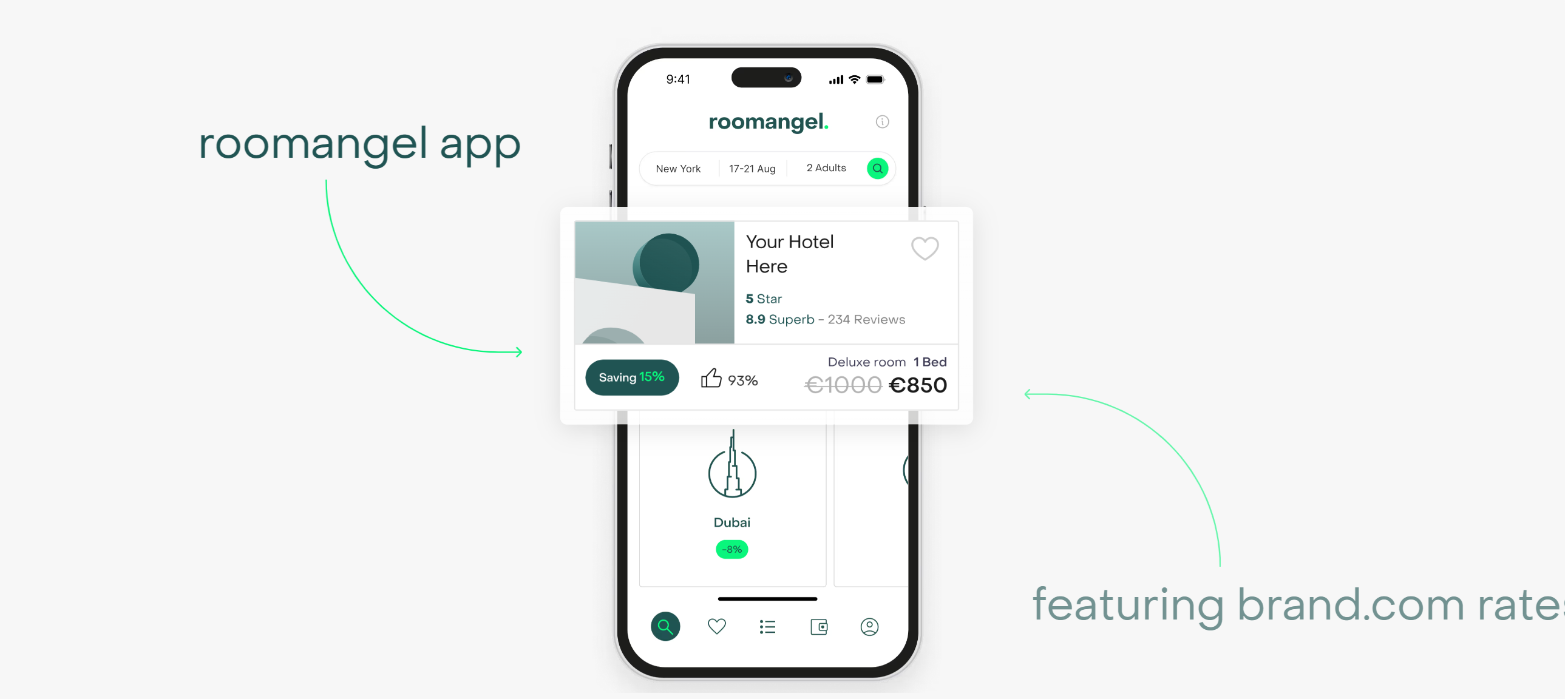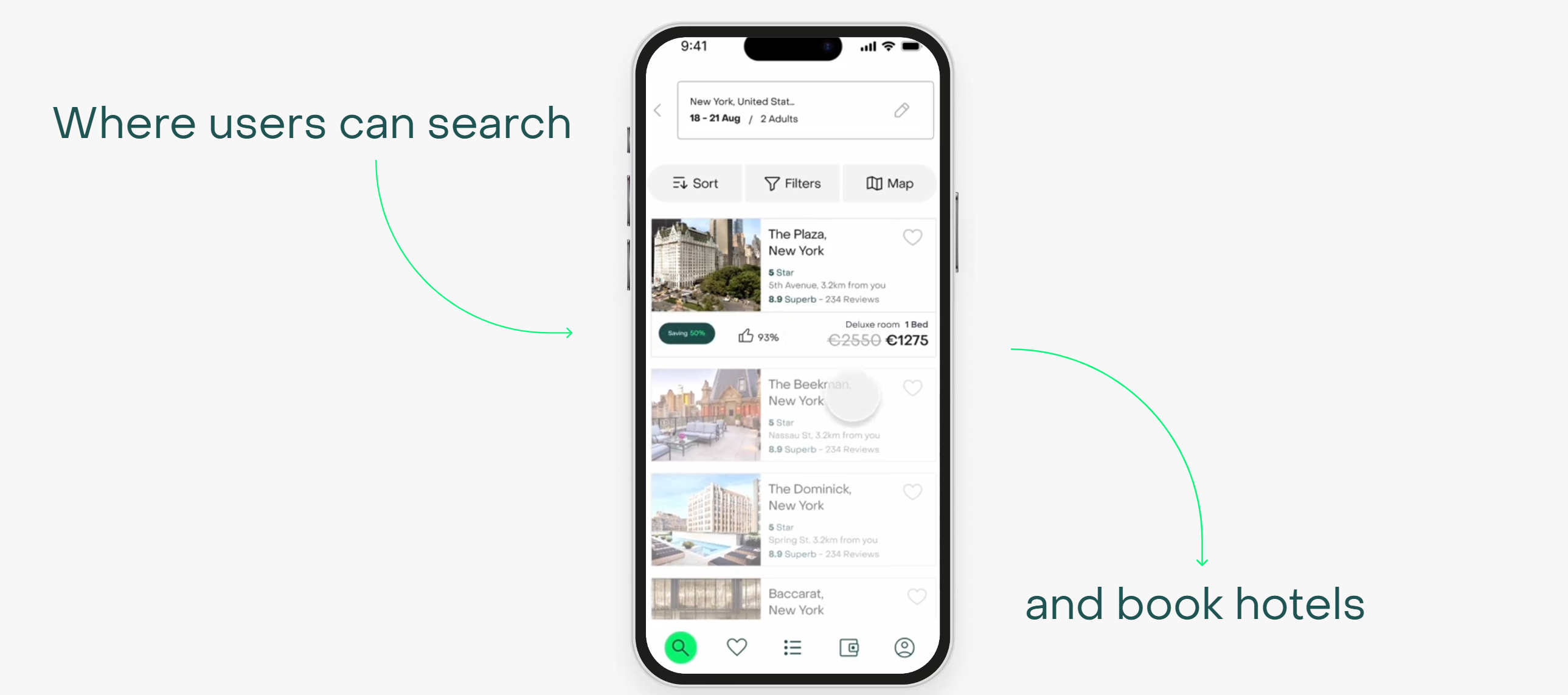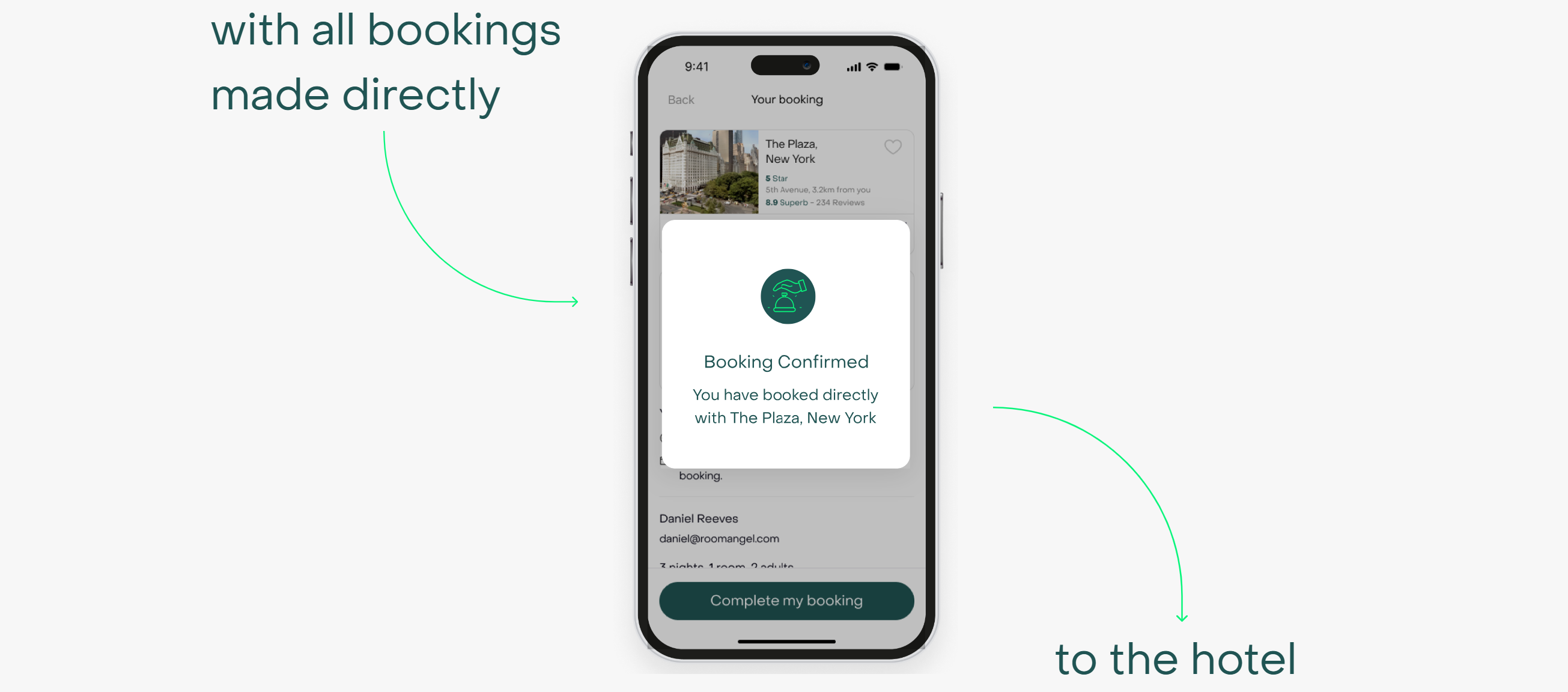
4.16.2025
For more than two decades, Brian Reeves has been at the forefront of hotel technology innovation, working tirelessly to help hoteliers compete in an industry long dominated by Online Travel Agencies (OTAs). As the Founder and CEO of Avvio, one of the most successful booking engine and digital marketing companies in hospitality, he led the company to multiple Deloitte Fast 50 tech awards and earned recognition as a finalist for the Ernst & Young Entrepreneur of the Year Award. A widely respected voice on hotel distribution strategy and the psychology of booking behavior, Brian has advised hospitality leaders around the world on how to optimize direct bookings and reclaim guest relationships.
Now, as Founder and CEO of The roomangel Foundation, he’s taking that mission to the next level. The Foundation is an industry-led initiative dedicated to reshaping hotel distribution by giving control back to hotels and creating a more transparent, trusted booking experience for travelers. In this interview, Brian shares the inspiration behind roomangel, how it builds on his past work, and why he believes this could be the most transformative moment yet in the battle for hotel distribution fairness.
What inspired you to launch The roomangel Foundation, and how does it build on your experience with Avvio?
For over 25 years, my focus has been hotel technology — helping hoteliers navigate the digital landscape and compete with Online Travel Agencies (OTAs). With Avvio, we worked on booking engine technology, digital marketing, and web design to improve direct bookings. But while we made progress, the fundamental problem persisted: OTAs continued to dominate hotel search and control distribution, keeping commission rates high and guest data out of reach for hotels.
roomangel is the next evolution of that mission. We are creating a level playing field by ensuring that hotel websites are the best place to book, while roomangel becomes the trusted place to search. Unlike OTAs, which prioritize commission over consumer value, roomangel is redefining hotel search and booking transparency — giving both hoteliers and travelers a fairer alternative.

Can you explain the core mission of The roomangel Foundation and why it’s important for the hospitality industry?
The core mission of The roomangel Foundation is to restore control to hotels while ensuring travelers get unbiased, transparent booking options. The hotel distribution landscape has long been skewed — OTAs charge high commissions, control guest relationships, and manipulate search rankings based on commission agreements rather than guest value.
roomangel changes this. Our organization provides free tools to hotels that improve website conversion rates, reducing OTA dependency. It directly integrates with hotel booking engines, ensuring guests always book direct. It offers a reliable and objective model to identify true value for money, reducing consumer confusion around rate fairness. The search and booking platform ranks hotels based on actual value-for-money, not how much commission they pay.
We are structured as a non-profit foundation owned by the industry, ensuring that hotels will always have a seat at the table when it comes to their own distribution.
What makes this initiative different from previous attempts to reform hotel distribution?
There have been many attempts to disrupt hotel distribution, but most have failed because they replicated OTA models, introduced new intermediaries, or were profit-driven at the expense of hotels. The result was a cycle of well-intentioned innovations that failed to truly change the system.
roomangel is different. Unlike previous attempts, it is not a for-profit enterprise looking to capitalize on hotel distribution — it is a non-profit foundation, owned by the industry itself. In addition, instead of making hotels compete for visibility based on how much commission they are willing to pay, roomangel platform removes the pay-to-play dynamic entirely. Search rankings are based on true value-for-money, ensuring that travelers see hotels in an objective, transparent manner, rather than listings dictated by commission agreements.
Perhaps the most critical piece of this transformation is fixing the fundamental price trust issue that plagues direct bookings. When travelers visit hotel websites, they often abandon the booking process because they are uncertain whether the rate they see is fair. This hesitation sends them back to OTAs or metasearch engines, where persuasive tactics — often designed to create a false sense of urgency — push them toward making a decision. roomangel eliminates this friction by providing a clear, independent price verification system that gives consumers confidence in the rate they are seeing.
roomangel is not just another booking platform that tweaks the existing model. It is a fundamental restructuring of how hotel distribution works, ensuring that hotels no longer need to pay for visibility or surrender guest relationships to third parties. It is a solution designed for long-term fairness, transparency, and sustainability, built not to extract profit from the industry, but to restore control, trust, and true competition where it belongs.
How has the response been from hoteliers and booking engine providers so far?
The response has been overwhelmingly positive and enthusiastic. For the first time, hotels and booking engine providers are coming together to challenge OTA dominance in a way that benefits both parties. Key industry leaders have already hailed roomangel as “the biggest change in hotel distribution history.” Major booking engine providers have already joined forces with us, understanding that a fairer, more balanced distribution model benefits everyone, except the middlemen.
Can you tell us more about the Verified by roomangel stamp and how it builds consumer trust?
The Verified by roomangel stamp on the hotel’s own website (a free product offered by The roomangel Foundation) is designed to tackle two of the most persistent challenges in hotel distribution: fraudulent booking sites and price uncertainty. Fake booking websites have become an industry-wide problem, tricking travelers into thinking they are booking directly with a hotel when, in reality, they are handing over their payment details to unauthorized third parties. This not only leads to financial loss and frustration for guests but also damages the hotel’s reputation, as travelers often blame the property for issues beyond its control. The Verified by roomangel stamp puts an end to this by providing a clear, independent verification system, ensuring that travelers are always booking directly with the hotel itself.
Beyond security, the stamp also addresses one of the biggest obstacles to direct bookings: price transparency. Travelers often hesitate to book through a hotel’s website because they are unsure whether they are truly getting the best deal. roomangel removes this uncertainty by introducing an objective value-for-money indicator on the hotel’s own website, reassuring travelers that they are making a smart booking decision.
By solving both the trust gap and the price confidence issue, the Verified by roomangel stamp directly boosts hotel website conversion rates, making it easier for guests to book with confidence, without hesitation, and without the need for intermediaries.

The Foundation is launching a hotel search and booking platform—how does it work, and what makes it unique?
roomangel’s platform is the first-ever hotel search and booking solution that offers the convenience of a centralized search engine while ensuring direct bookings. What makes it unique is that there are no commission-driven rankings — hotels are ranked by value for money, not by how much they pay. Reservations are booked directly into the hotel’s own booking engine, with no intermediaries and no hidden fees. Unlike OTAs, hotels get to present their brand and offerings properly, thanks to hotel-first content. And with a static commission of either 6% or 9%, depending on the membership tier, our rates won’t increase over time. This is the first real alternative to OTAs — designed to benefit both hotels and travelers.
How does the platform ensure that search results prioritize guest value over commission-driven rankings?
Unlike OTAs, which rank hotels based on commission agreements, roomangel ranks hotels based on actual value-for-money for the traveler. The platform’s algorithm considers pricing fairness, guest reviews, location, and amenities rather than how much a hotel is willing to pay to appear higher in search results.
Hotels cannot “buy” a better position by increasing their commission payments. Instead, they are fairly compared on the quality of their offering, ensuring travelers get honest, unbiased search results. This creates a genuinely competitive landscape, where hotels succeed based on service and value rather than commission fees.
What are the biggest challenges hotels face today when it comes to reclaiming control over their distribution?
Hotels today face an uneven battle when it comes to reclaiming control over their own distribution. Many feel trapped in a system that forces them to rely on OTAs, viewing them as a “necessary evil” rather than a strategic partner. While hoteliers would prefer to drive more direct bookings, they are often held back by marketing budget constraints, unable to compete with OTAs that spend billions dominating Google search results. This imbalance leaves hotels struggling to be seen by their own potential guests.
Even when travelers do land on a hotel’s website, a lack of consumer trust in direct bookings becomes another hurdle. Over the years, OTAs have successfully conditioned guests to believe that their platforms offer the best deals, even when that is not the case. As a result, many travelers hesitate to book directly, fearing they might be missing out on a lower rate elsewhere. And beyond pricing concerns, the fragmented nature of hotel technology creates additional friction — many hotel booking engines lack seamless user experience, making the direct booking process clunky, inconvenient, and less appealing than the streamlined experience OTAs provide.
roomangel is addressing these challenges by creating a centralized, consumer-trusted search platform that ensures guests can discover hotels easily and book directly. roomangel also eliminates the uncertainty that drives travelers away from hotel websites, giving them confidence that they are getting a fair deal. And unlike OTAs, which have steadily increased their commission rates over the years, roomangel operates with a transparent, industry-backed commission model of just 6% or 9% (depending on the membership tier) — a structure designed to remain fair and stable over time, ensuring that hotels are no longer at the mercy of ever-rising fees.
What advice would you give to hoteliers looking to maximize direct bookings and reduce OTA dependency today?
Hoteliers must take proactive steps now to regain control over distribution. They should focus on fixing the price trust issue by implementing tools like roomangel’s price verification system to reassure travelers that they’re getting the best deal on the hotel’s website. They should optimize direct booking experiences by ensuring hotel websites are fast, user-friendly, and mobile-optimized. Since OTAs withhold guest data, hotels should leverage first-party data by capturing guest emails and preferences early and using that data to drive loyalty and re-engagement. It’s also important to educate travelers by using social media, website messaging, and direct email marketing to highlight why booking direct is better—offering better perks, better service, and better rates.
Finally, hotels should diversify distribution and stop relying on OTAs as the primary booking channel, experimenting instead with direct channels, metasearch, and industry-supported platforms like roomangel. By taking control, hotels can reduce OTA reliance and establish a stronger, more sustainable distribution strategy that benefits both their business and their guests.

What kind of data ecosystem will the Foundation provide to help hotels optimize demand?
roomangel is more than a booking platform — it’s a data powerhouse. The Foundation will provide hotels with access to industry-wide pricing trends, booking behavior insights, and competitive benchmarking data that OTAs have long monopolized. Hotels will gain visibility into market demand forecasts through real-time occupancy trends in different locations. They’ll gain booking behavior insights to learn how guests search, compare, and book, allowing them to improve conversion. They’ll also access pricing intelligence to understand whether their rates are competitive or need adjustment, as well as guest engagement data that reveals loyalty behaviors, direct booking preferences, and post-stay reviews.
This rich data ecosystem empowers hotels to make smarter pricing and marketing decisions, optimize revenue, and drive demand independently of OTAs.
How do you see global regulations, such as the Digital Markets Act (DMA), affecting OTAs and hotel distribution moving forward?
The Digital Markets Act (DMA) is a game-changer for hotel distribution, taking direct aim at the dominance of gatekeeper platforms like OTAs and Google. For years, these platforms have controlled the visibility of hotels, using opaque ranking algorithms and self-serving business practices to prioritize their own interests over those of hotels and travelers. The DMA is changing that by introducing much-needed transparency and accountability.
One of the most significant shifts will be the restriction of unfair ranking manipulations, forcing OTAs to be more transparent about how search results are ordered. This means hotels will no longer be pushed to the bottom of listings simply because they aren’t paying the highest commissions. Additionally, self-preferencing will be banned, preventing platforms from prioritizing their own services over direct booking options. For hoteliers, this is a crucial step toward a level playing field, where direct channels finally have a fair chance to compete for visibility.
This regulatory shift aligns perfectly with roomangel’s mission — to create a fairer, more transparent hotel distribution ecosystem. By eliminating commission-driven ranking systems and opaque business practices, the DMA supports the very principles that roomangel was built on: empowering hotels, giving travelers unbiased choices, and removing the barriers that have long favored intermediaries over direct bookings.
What lessons can the industry learn from the recent EU ruling on rate parity clauses?
How does the Foundation plan to drive consumer adoption of direct hotel booking when OTAs dominate marketing and loyalty programs?
Finally, none of these changes will succeed unless travelers understand why direct booking is better. There are so many misconceptions about OTAs, from the idea that they always offer the lowest rates to the belief that they provide better cancellation policies. roomangel is taking a proactive approach with consumer education campaigns, designed to debunk these myths, reinforce trust in direct booking, and empower travelers to make more informed choices.
We’re also leveraging strong regulatory tailwinds. Regulators have been chasing OTAs for years over anti-competitive practices, but we’re taking a proactive approach by making Roomangel fully transparent and compliant from day one.
How do you envision hyper-personalization changing the way hotels interact with guests before, during, and after their stay?
Hyper-personalization, driven by AI and real-time data, will completely transform guest engagement. Hotels will move from generic interactions to deeply customized, real-time guest experiences. Before the stay, hotels can predict guest preferences, offer personalized booking recommendations, and provide tailored pre-arrival experiences such as room customization or activity suggestions. During the stay, AI-driven assistants can provide real-time recommendations based on a guest’s behavior, such as suggesting a spa treatment at the right moment or alerting housekeeping to specific guest preferences. After the stay, personalized follow-ups, exclusive return offers, and AI-driven loyalty incentives will help turn first-time guests into repeat visitors. roomangel’s data ecosystem will enable hotels to develop hyper-personalized strategies that enhance guest satisfaction and drive long-term loyalty.
What are the biggest hurdles in shifting consumer behavior away from OTAs to direct booking channels?
Looking ahead five years, how do you see hotel distribution evolving, and what role will The roomangel Foundation play in that evolution?
We believe that in five years, the landscape of hotel distribution will look very different. OTA dominance will decline, and direct hotel bookings will finally thrive — but this shift will only happen if the right tools and industry-wide changes are in place. As transparency becomes a greater priority for travelers, they will start to trust direct bookings more than third-party platforms.
At the same time, regulations will continue to push for greater transparency, forcing OTAs to operate under clearer guidelines rather than relying on opaque ranking systems, restrictive rate parity clauses, and misleading marketing tactics.
In this evolving landscape, roomangel will emerge as the industry standard, providing travelers with a fair, unbiased alternative to OTAs while ensuring that hotels maintain ownership of their pricing, inventory, and customer relationships. Our role is to lead this transformation, creating a system that is fundamentally different from the one the industry has been forced to accept for so long. The next era of hotel distribution must be fair, transparent, and customer-oriented — and we are building the foundation to make that future a reality.
How can hoteliers, tech providers, and consumers get involved with The roomangel Foundation to support its mission?
